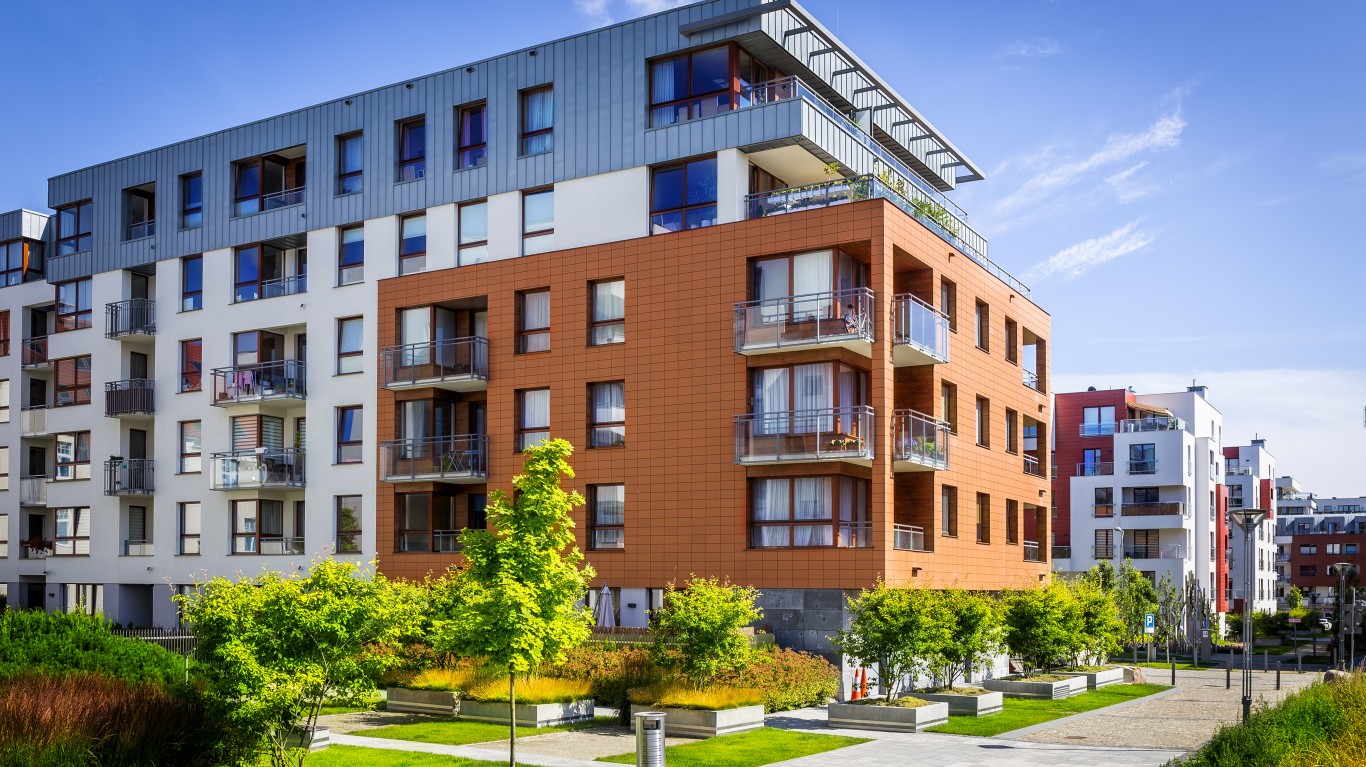
Even in the Great Recession and the years after 2008 and 2009, there was a steady belief that even if people weren’t buying homes they actually had to live somewhere that had a roof, air conditioning and utilities. That is still true in the instant recession caused by the COVID-19 pandemic. Over 26 million jobless claims were filed in recent weeks, and millions of other workers are seeing reduced pay or slower contract payments.
Suddenly, millions of Americans are now late on their rent, and there may be little hope that they will be paying rent in May, June and so on. This has created an absolute gutting of the apartment sector within real estate investment trusts (REITs). This has been a go-to sector in the past decade for investors looking for stability and dividends. When investors own apartment REITs, they effectively get to be a landlord, without all of the daily hassles of owning and renting out properties.
As apartments are suddenly finding themselves missing rent checks, the drop in their income likely will pressure their dividends. After all, REITs pay out almost all their income to shareholders as dividends to retain a favorable tax structure. If income goes way down, dividends have to come down over time as well. This is why so many apartment REITs have seen their share prices plunge from earlier this year. The sector went from safe and bulletproof to vulnerable and leveraged in less than 60 days.
24/7 Wall St. has been looking at many sectors for the opportunities in which investors will want to be after the economic dust cloud settles. It’s impossible to predict an economic upturn in the coming weeks, but the U.S. government has just thrown trillions of dollars at the economy to stabilize it. Employees who were laid off might be recalled under the Paycheck Protection Program, or they still have access to the stimulus checks or to unemployment.
Most renters will do whatever they can to avoid being evicted from their apartments. The current situation is also bad enough that landlords, including many apartment REITs, already have made assumptions about waves of rent payments being avoided or delayed. Some states have laws that make it illegal immediately to evict renters who do not pay their rent.
The reality is that it will take time before we know how many renters will skip out on their rent payments. If big companies like retail apparel and other large companies are skipping paying their rents, it’s going to be much more common for individuals to do likewise. One thing that is almost certain is that there will come a day, hopefully not too far in the future, that the economy is back to normal and individuals will once again be making normal rent payments.
One long-term issue just went in the favor of apartments over homeownership as well. Coming up with 20% to buy a home will be the norm all over again, and applying for a mortgage generally requires a steady job that has seen steady income. To get through the recession, many individuals will eat into their savings accounts. We have to assume that all the government efforts to protect the public’s finances and the economy will keep the mantra “people have to live somewhere” from becoming “being homeless isn’t what it used to be.”
We screened the universe of S&P 500 and other REITS with a market cap of $2 billion or more to avoid some smaller companies that are not very diversified. Investors have to assume that the apartment REITs will face volatility in earnings (or funds from operation) that could push some apartment REITs to lower or temporarily suspend their dividend payments. That means that every one of these dividend yields has a “caveat emptor” for potential cuts.
We have compared current share price data to the Refinitiv consensus analyst price targets and to historical trading prices. Companies were excluded if their dividends were suspended already or their business was overly complex, or if geographic exposure was too narrow.
Mid-America Apartment Communities Inc. (NYSE: MAA) was recently featured in 15 Basic Economy Stocks to Own After the Recession. It is worth more than $12 billion, and it counts more than 100,000 apartment units spread across 16 states. It also had close to a 3.6% yield, and its stock price is still down about 30% from its highs.
Apartment Investment and Management Company (NYSE: AIV) is a $5.2 billion apartment REIT with a hopeful 4.6% yield. More dividend news should be coming out before the end of April, but trading at $35.00, it has a 52-week range is $24.53 to $55.68. Aimco also has a consensus price target of $44.17. The Colorado-based outfit has more than 120 communities spread across 17 states.
AvalonBay Communities Inc. (NYSE: AVB) is a $22 billion apartment REIT, and it raised its payout back in February, before things went south. Its $157 share price generates a 4.0% dividend yield. The 52-week range is $118.17 to $229.40 and the consensus target price is $180.72. Its portfolio consists of almost 300 apartment communities (containing 86,846 units) in 11 states. The Arlington, Virginia-based company has noted that its communities also counted about 20 that were under development or redevelopment.
Camden Property Trust (NYSE: CPT) is an apartment REIT valued at more than $8 billion, and its $83.25 share price generates a 4% dividend yield. It also recently raised $750 million in new long-term financing. Camden is based in Houston, Texas, so it may have extra exposure due to weak oil and gas. Looking at the total projects and existing locations, it has over 58,000 units in 172 properties in 18 different cities spread in about half as many states. Trading at $83.25, it has a consensus price target is $101.67 and a 52-week range of $62.48 to $120.73.
Equity Residential (NYSE: EQR) was trading at $64.00, and its market cap was nearly $24 billion. Its dividend yield was close to 3.75%, and it has a 52-week range of $49.62 to $89.55. The consensus price target is $70.53. Equity Residential is based in Chicago. It currently counts over 300 projects, with right at 80,000 rental units spread in 11 of the top metro markets in America.
In 20 Years, I Haven’t Seen A Cash Back Card This Good
After two decades of reviewing financial products I haven’t seen anything like this. Credit card companies are at war, handing out free rewards and benefits to win the best customers.
A good cash back card can be worth thousands of dollars a year in free money, not to mention other perks like travel, insurance, and access to fancy lounges.
Our top pick today pays up to 5% cash back, a $200 bonus on top, and $0 annual fee. Click here to apply before they stop offering rewards this generous.
Flywheel Publishing has partnered with CardRatings for our coverage of credit card products. Flywheel Publishing and CardRatings may receive a commission from card issuers.
Thank you for reading! Have some feedback for us?
Contact the 24/7 Wall St. editorial team.

 24/7 Wall St.
24/7 Wall St.



